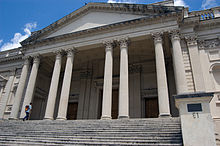British School at Rome

The British School at Rome, designed by Sir Edwin Lutyens
|
|
| Established | 1901 |
|---|---|
| Location |
Rome, Italy London, United Kingdom |
| Coordinates | 41°55′06″N 12°28′52″E / 41.9183°N 12.4812°E |
| Type |
Research centre Humanities & Visual Arts |
| Director | Christopher Smith |
| President | HRH Princess Alexandra |
| Website | Official website |
The British School at Rome, which is based in Rome, Italy, is a leading humanities and fine arts research institution of the United Kingdom.
The British School at Rome (BSR) was established in 1901 and granted a UK Royal Charter in 1912. Its mission is "to promote knowledge of and deep engagement with all aspects of the art, history and culture of Italy by scholars and fine artists from Britain and the Commonwealth, and to foster international and interdisciplinary exchange." BSR is a registered charity under English law.
In 1911, the British Pavilion for the International Exhibition in Rome, celebrating 50 years since Italian reunification, was granted in perpetuity to the British nation – on condition that it be used exclusively as a research centre for archaeology, history and the fine arts. In 1916, after significant adaptation by its architect, Edwin Lutyens, the BSR moved into its current home in what is now via Antonio Gramsci, in the Valle Giulia. In 2002, a new purpose-built lecture theatre and gallery spaces, designed by architect Hugh Petter and sponsored by the Sainsbury family, were opened by the BSR’s President, HRH Princess Alexandra. The BSR is immediately adjacent to the Villa Borghese gardens and the Galleria Nazionale d'Arte Moderna.
Today, the BSR awards full-board residential scholarships and fellowships to artists and scholars from across the Commonwealth for periods from 3 to 12 months. BSR awards are considered to enjoy substantial prestige within their respective fields. All scholars, artists and award holders share the same, Lutyens-designed residence, which is located north of the Pincio in the Parioli district. As well as access to one of Rome's leading English-language art and archaeology libraries awardees are lodged in the academy’s individual rooms and are catered for in the communal dining and recreational facilities. The fine art awards provide artists with purpose-built, fully equipped, live-in studios and workshop facilities.
...
Wikipedia
